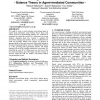Free Online Productivity Tools
i2Speak
i2Symbol
i2OCR
iTex2Img
iWeb2Print
iWeb2Shot
i2Type
iPdf2Split
iPdf2Merge
i2Bopomofo
i2Arabic
i2Style
i2Image
i2PDF
iLatex2Rtf
Sci2ools
138
Voted
ATAL
2003
Springer
2003
Springer
Can software agents influence human relations?: balance theory in agent-mediated communities
We sought to create a social embodied conversational agent to support group interactions, using ‘balance theory’ from social science research on human-human relations. We conducted an experiment to evaluate the social ECA’s effectiveness in a group situation, depending upon how strongly it mediated the conversation among group members. First, we confirmed that it could win favorable feelings from subjects by showing an agreeing attitude to them and, conversely, unfavorable feelings by showing a disagreeing attitude. Next, we validated balance theory as a rule governing both agent-human relations and human relations if the social ECA highly mediated the conversation. We found that the social ECA’s effectiveness was very low if it did not control turn-taking, and if the human pair had a chance to converse extensively with one another. Conversation analysis corroborated these results. Categories and Subject Descriptors I.2.11 [Artificial Intelligence]: Distributed Artificial Inte...
| Added | 06 Jul 2010 |
| Updated | 06 Jul 2010 |
| Type | Conference |
| Year | 2003 |
| Where | ATAL |
| Authors | Hideyuki Nakanishi, Satoshi Nakazawa, Toru Ishida, Katsuya Takanashi, Katherine Isbister |
Comments (0)

